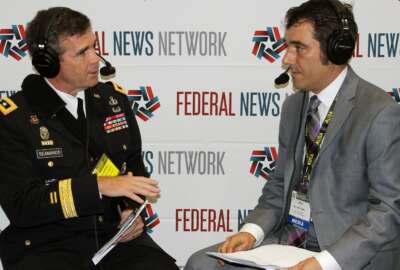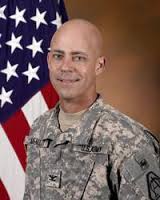
Top enlisted adviser says despite changing needs, career tracks will not change
The military is not yet ready to change the trajectory of noncommissioned officer's careers.
Despite the changing needs of service members and the draw of private sector hiring, the nation’s top non-commissioned officer does not think it’s necessary to change the career pathways of enlisted troops to retain them.
“The strength of our military is our enlisted force and the backbone is our enlisted leaders,” Command Sgt. Maj. John Troxell, senior enlisted adviser to the chairman of the Joint Chiefs of Staff said at the Pentagon Wednesday. “That didn’t just happen overnight, that all of a sudden we can trust and empower them. It’s through a process of service indoctrination and education that has brought them up to this requisite rank that they’re at.”
Congress, at the behest of the Defense Department, broke up some of the rigidity of the officer promotion system last year in the 2019 defense authorization act. That law allowed officers to skip promotion boards, take opportunities outside of the preordained career path and allowed the military services to directly commission new recruits with special skills.
While Troxell said the military needs to offer more benefits similar to the private sector, he did not think instituting changes like the ones to the officer promotion system would be productive.
“Our process through our non-commissioned officer and petty officer education system is critical to building the leaders we need for this dynamic environment,” Troxell said.
One area where the Defense Department is concerned about retaining and recruiting troops is in the cyber realm.
“We are looking with the other services to see what are some alternative options available to keeping in talent,” Master Gunnery Sgt. Scott Stalker, command senior enlisted leader for U.S. Cyber Command and the National Security Agency. “Often times as I talk to the troops who are executing mission, it’s more about the ability to stay on mission vice a lot of permanent changes of station and so we are looking at those as options.”
Stalker said what’s interesting about NSA and CYBERCOM is that rank does not always equate to capability.
“It’s sometimes your more junior enlisted who are most capable,” Stalker said. “It’s the E-5s or E-6s with the subject matter expertise who are on mission every single day against our adversaries. We are looking across the entire spectrum for different ideas to retain talent. Whether that’s an opportunity to have initial contracts that are longer, potentially working with academia or industry.”
Related Stories
“That’s around 25% right now,” Troxell said. “More and more there needs to be a relationship between recruiters and influencers in our community. Also to continue to impress upon these influencers the requisite talent we need and to focus on men and women that want to serve in the military.”
While the enlisted side of the military isn’t making drastic changes to its promotion system, the Army is making small changes to keep enlisted talent.
It is implementing a new system that will push top performers in their ranks ahead of those who have served longer in the same position for sergeant first class and above.
“The new process will allow us to promote faster as requirements become available,” Army Sgt. Maj. Mark Clark of the Military Personnel Management Directorate told Federal News Network. “The new process will help enhance readiness so we can put the right soldiers at the right times in organizations to arm those Army weapons systems that we have sooner than later.”
Copyright © 2025 Federal News Network. All rights reserved. This website is not intended for users located within the European Economic Area.
Scott Maucione is a defense reporter for Federal News Network and reports on human capital, workforce and the Defense Department at-large.
Follow @smaucioneWFED






